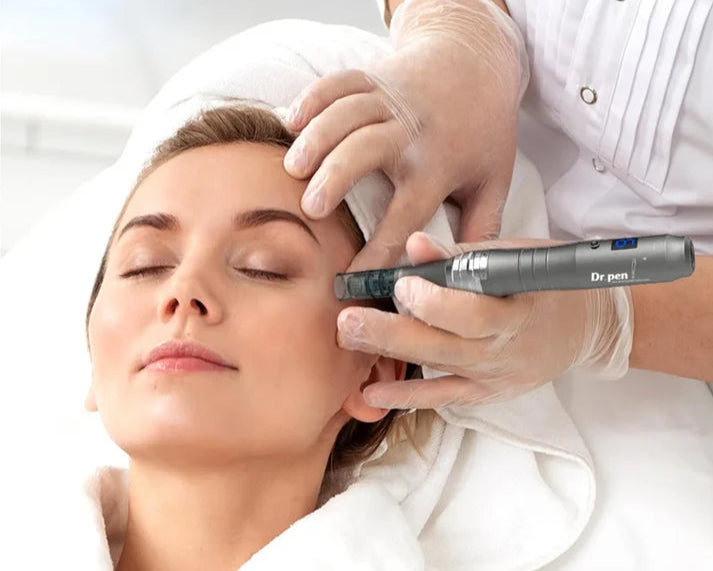In the quest for radiant, youthful skin, the beauty industry is constantly evolving, introducing innovative techniques and tools designed to enhance our natural beauty. One such tool that has gained significant popularity in recent years is the microneedling pen. This handheld device, equipped with tiny needles, promises to rejuvenate the skin by stimulating collagen production and improving overall skin texture. If you're intrigued by the potential benefits of microneedling and wondering how to incorporate it into your existing skincare routine, this comprehensive guide is for you.

Understanding Microneedling
Microneedling, also known as collagen induction therapy, is a minimally invasive procedure that involves puncturing the skin with fine needles. This process creates micro-injuries to the skin's surface, triggering the body's natural healing response. As a result, the skin produces more collagen and elastin, which are essential for maintaining skin firmness and elasticity.
The microneedling pen is a modern iteration of this technique, offering a more controlled and precise application compared to traditional derma rollers. With adjustable needle lengths, it can cater to various skin concerns and types, making it a versatile addition to your skincare arsenal.
Benefits of Microneedling
Before integrating a microneedling pen into your routine, it's essential to understand its potential benefits. Here are some of the key advantages:
Enhanced Collagen Production: By stimulating the skin's repair mechanism, microneedling boosts collagen synthesis, leading to firmer, smoother skin.
Improved Skin Texture: The procedure can help reduce the appearance of fine lines, wrinkles, and scars by promoting cell turnover.
Even Skin Tone: Microneedling can assist in fading pigmentation issues, such as sunspots and melasma, resulting in a more even complexion.
Product Absorption: The micro-channels created by the needles allow skincare products to penetrate deeper into the skin, enhancing their effectiveness.
Preparing for Microneedling
Incorporating a microneedling pen into your skincare regimen requires careful preparation to ensure safety and maximize results. Here are some steps to follow:
Consult a Professional: If you're new to microneedling, it's advisable to consult a dermatologist or a professional aesthetician. They can assess your skin type, address any concerns, and provide personalized advice.
Choose the Right Needle Length: Microneedling pens typically come with adjustable needle lengths. For beginners, it's recommended to start with shorter needles (0.25mm to 0.5mm) to minimize risk and discomfort. Longer needles (up to 2mm) are suitable for addressing deeper skin concerns but should be used under professional guidance.
Cleanse and Dry Your Skin: Prior to microneedling, thoroughly cleanse your skin to remove any dirt, oil, or makeup. Pat your skin dry to avoid any irritation during the procedure.
Numbing Cream (Optional): For those with a low pain tolerance, applying a numbing cream 30 minutes before the treatment can help minimize discomfort.
Incorporating Microneedling into Your Routine
Now that you're prepared, let's delve into how to seamlessly integrate microneedling into your skincare routine:
Step-by-Step Guide
Start Slow: If you're performing microneedling at home, begin with a lower needle length and gradually increase as your skin becomes accustomed to the treatment.
Section Your Skin: Divide your face into smaller sections (forehead, cheeks, nose, and chin) to ensure even coverage and better control during the process.
Glide the Pen: Hold the microneedling pen at a 45-degree angle and gently glide it over each section in a horizontal, vertical, and diagonal motion. Avoid applying too much pressure to prevent excessive trauma to the skin.
Focus on Problem Areas: Spend a bit more time on areas with concerns, such as scars or pigmentation, but be cautious not to overdo it.
Sanitize and Store: After use, clean the microneedling pen according to the manufacturer's instructions and store it in a sterile container to prevent contamination.
Post-Microneedling Care
The aftercare is as crucial as the procedure itself. Here's how to care for your skin post-microneedling:
Avoid Irritants: For the first 24-48 hours, steer clear of harsh skincare products, exfoliants, and retinoids that can irritate the skin.
Hydrate: Use a gentle, hydrating serum or moisturizer to soothe and nourish the skin. Hyaluronic acid-based products are particularly beneficial during this time.
Sun Protection: Your skin will be more sensitive to the sun after microneedling. Apply a broad-spectrum sunscreen with at least SPF 30 daily to protect your skin from UV damage.
Avoid Heat: Stay away from saunas, hot showers, and other heat sources for a few days, as they can exacerbate redness and swelling.
Frequency of Use
The frequency of microneedling depends on your skin's tolerance and the severity of your skin concerns. As a general guideline, once every 4-6 weeks is suitable for most individuals. However, those with sensitive skin may need to space out treatments even further.
Potential Side Effects
While microneedling is generally safe, it's not without its risks. Possible side effects include:
Redness and swelling
Minor bleeding or bruising
Infection (if proper sanitation practices are not followed)
If you experience severe discomfort or persistent side effects, discontinue use and consult a healthcare professional.
Conclusion
Incorporating a microneedling pen into your skincare routine can be a game-changer for achieving healthier, more radiant skin. By understanding the basics, preparing properly, and following a meticulous post-care regimen, you can harness the power of microneedling to address a variety of skin concerns. Remember, patience and consistency are key. With time, you'll likely notice a visible improvement in your skin's texture, tone, and overall appearance. As always, prioritize your skin's health and consult professionals when in doubt. Happy microneedling!

Share:
Can Microneedling Pen Help with Uneven Skin Tone?
Can Microneedling Pen Help with Eczema?